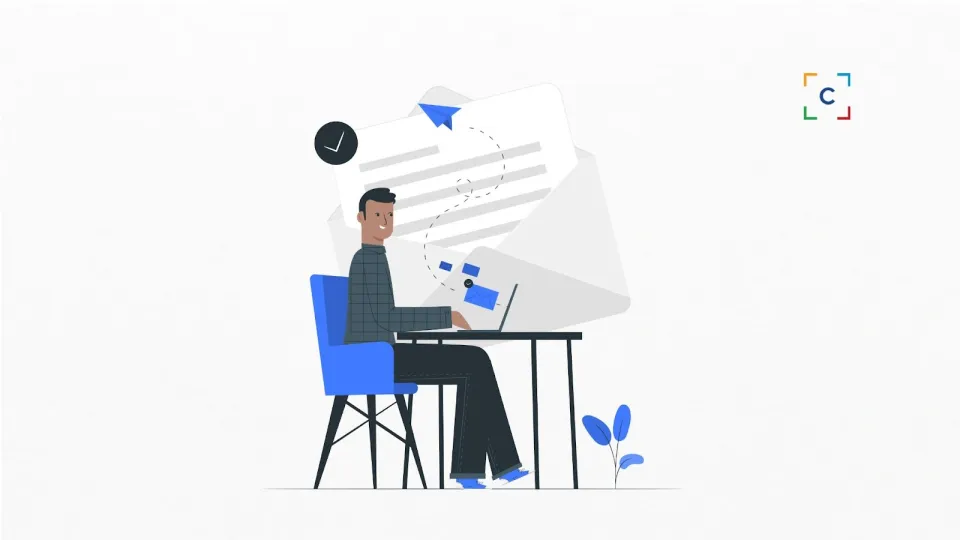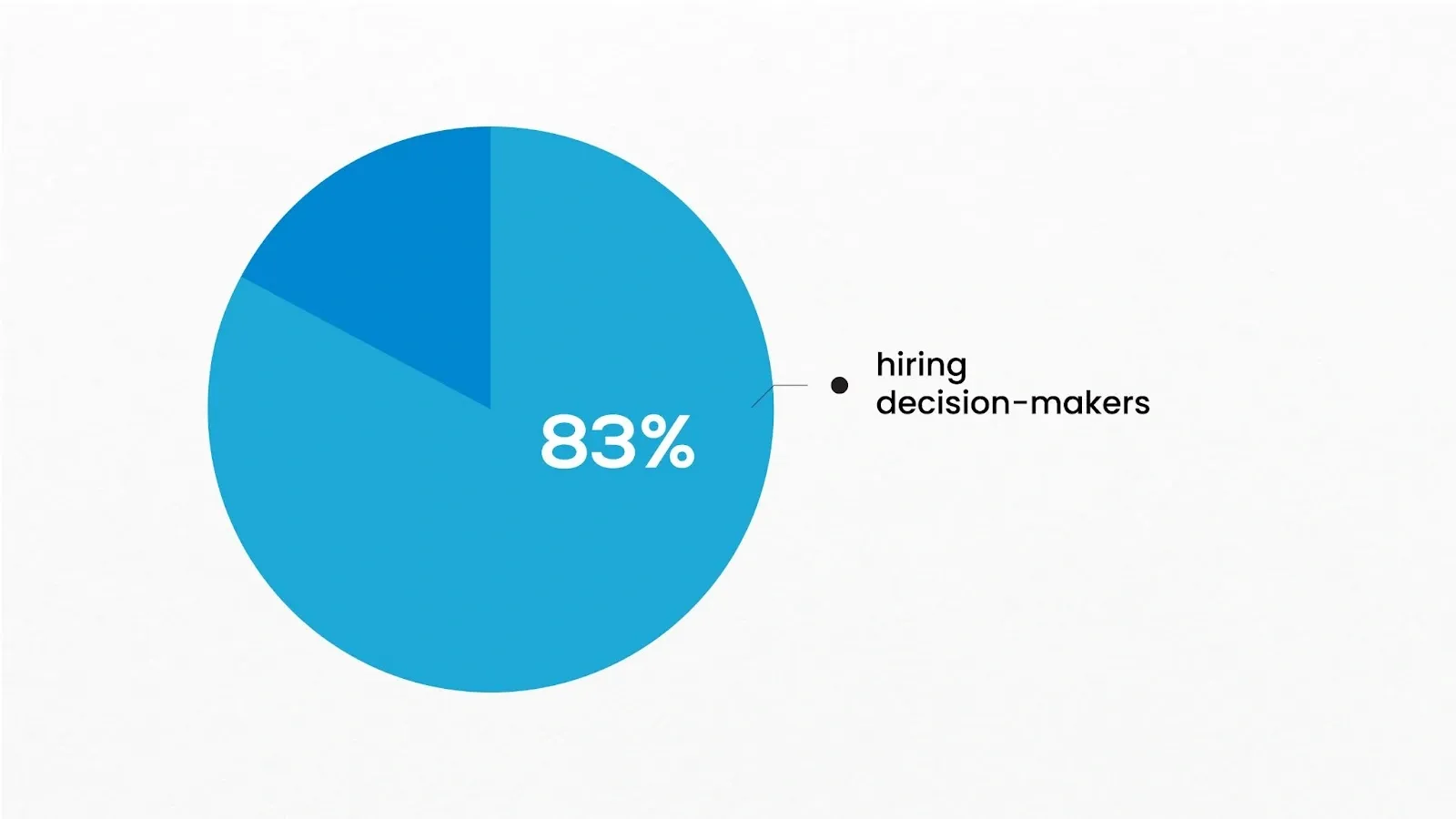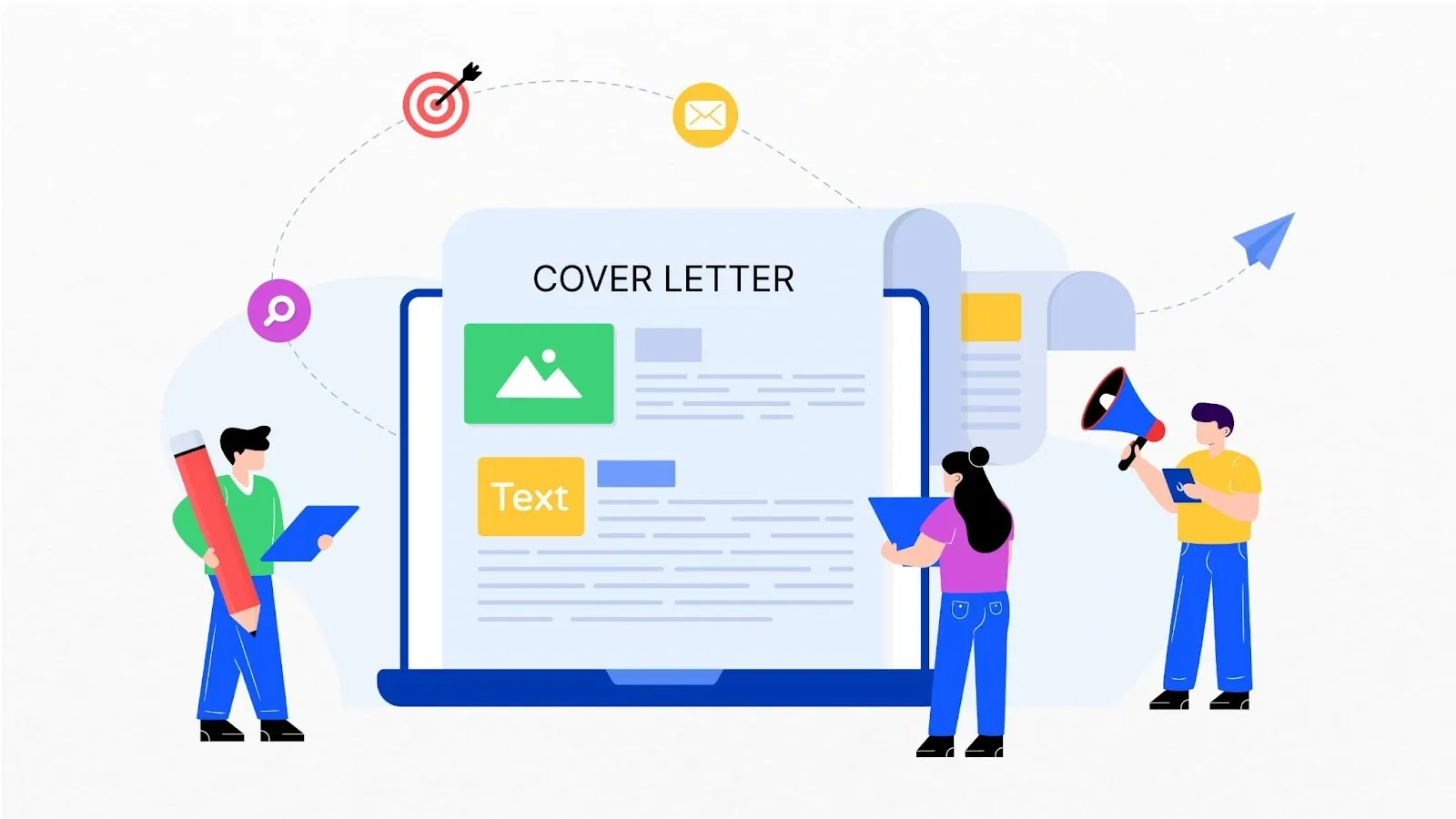How to Craft Perfect Cover Letter in 15 Minutes: A Step-by-Step Guide

Is your cover letter a hidden gem or a forgotten draft?
Forget 'don't judge a book by its cover' - but your CV and cover letter should be judged on its appearance.
An employer may have many resumes on their desk and most of the time they select based on their cover letter. Because that’s the first impression and concise form of your resume, based on which employer will decide whether to proceed forward or not. And a step close to your dream job.

According to a survey conducted last year, 83% of hiring decision-makers believe that a compelling cover letter could secure an interview, even if the accompanying CV was not as strong. The number speaks for itself.
In this blog let’s understand how to write and format cover letters, tips for writing cover letters and some cover letter examples.
Cover Letter
A cover letter is a document submitted along with a resume or job application that introduces yourself to the hiring manager and highlights your qualifications and experiences relevant to the job. It serves as a personalized message to the employer, showcasing your interest in the position and explaining why you are a strong candidate.
Elements of cover letter
- Header: Your contact information and the date.
- Salutation: Addressing the letter to a specific person if possible.
- Introduction: A brief introduction stating the position you are applying for and how you learned about the job.
- Body: 2-3 paragraphs highlighting your qualifications and relevant experiences.
- Closing: A conclusion expressing your enthusiasm for the position and thanking the employer for considering your application.
- Signature: Your name and signature if sending a hard copy, or your typed name if sending electronically.
Importance of cover letter
- Personalized Introduction: A cover letter allows you to introduce yourself to the employer in a personalized manner, highlighting your interest in the position and company.
- Showcase Relevant Experience: It provides an opportunity to showcase your relevant skills and experiences that make you a strong candidate for the job, which may not be fully captured in your resume.
- Demonstrate Communication Skills: Writing a well-crafted cover letter demonstrates your communication skills, attention to detail, and professionalism, which are important qualities employers look for.
- Highlight Fit for the Role: A cover letter allows you to explain how your background aligns with the job requirements and company culture, making a stronger case for why you are the right fit for the role.
- Stand Out from the Competition: A compelling cover letter can help you stand out from other applicants by showcasing your personality, enthusiasm, and unique qualifications, increasing your chances of getting noticed by employers.
Cover letter structure and Formatting

How to Write Cover Letter
- Header: The first thing to Include is your contact information at the top of the cover letter. Including your name, address, phone number, and email address. Also, include the date of the application.
- Salutation: Address the letter to a specific person if possible. If you don't know the name, you can use "Dear Hiring Manager" or "Dear [Company Name] Recruiter."
- Introduction: Start by introducing yourself and stating the position you are applying for. Mention how you learned about the job opening and express your interest in the position.
- Body: In the body of the cover letter, highlight your relevant skills, experiences, and achievements that make you a strong candidate for the position. Use specific examples to demonstrate your qualifications.
- Closing: Conclude your cover letter by expressing your enthusiasm for the position and your desire to further discuss your qualifications in an interview. Thank the reader for considering your application.
- Signature: End the cover letter with a professional closing, such as "Sincerely," and include your name and signature (if sending a hard copy).
- Proofread: Before sending your cover letter, make sure to proofread it carefully for any errors in grammar or spelling.
Here is a cover letter example for entry level job seekers:
[Your Name]
[Your Address]
[City, State, Zip Code]
[Email Address]
[Phone Number]
[Date]
[Hiring Manager's Name]
[Company Name]
[Company Address]
[City, State, Zip Code]
Dear [Hiring Manager's Name],
I am writing to express my interest in the [Job Title] position at [Company Name], as advertised on [where you found the job listing]. I recently graduated with a degree in [Your Degree] from [Your University], and I am excited about the opportunity to start my career at [Company Name].
During my studies, I developed strong skills in [Your Skills], which I believe make me a great fit for this position. I am particularly drawn to [Company Name]'s commitment to [Company Value or Project], and I am eager to contribute to your team.
Thank you for considering my application. I am enthusiastic about the possibility of joining [Company Name] and contributing to your team. I look forward to the opportunity to discuss my application with you further.
Sincerely,
[Your Name]
Cover letter writing tips
Writing an effective cover letter can significantly enhance your job application. Here are some tips to help you craft a compelling cover letter:
- Customize Each Letter: Tailor your cover letter for each job application, highlighting the most relevant skills and experiences that match the job description.
- Address the Hiring Manager: Whenever possible, address the cover letter to a specific person, such as the hiring manager or recruiter.
- Show Your Enthusiasm: Express your enthusiasm for the position and the company. Explain why you are interested in the role and how it aligns with your career goals.
- Highlight Your Achievements: Use specific examples to highlight your achievements and demonstrate how you have successfully contributed to previous roles.
- Use Keywords: Incorporate keywords from the job description into your cover letter to demonstrate that you have the skills and experience the employer is looking for.
- Keep It Concise: Your cover letter should be concise and to the point, typically no longer than one page.
- Proofread: Before sending your cover letter, carefully proofread it for any errors in grammar or spelling.
- Use a Professional Format: Use a professional format for your cover letter, including a header with your contact information, a salutation, an introduction, body paragraphs, and a closing.
- Font and Margins: Use a professional font, such as Times New Roman or Arial, in 10 to 12-point size. Use standard margins (1 inch) on all sides of the page.
Here is a customized Cover letter example of entry level technical writer
[Your Name]
[Your Address]
[City, State, Zip Code]
[Email Address]
[Phone Number]
[Date]
[Hiring Manager's Name]
[Company Name]
[Company Address]
[City, State, Zip Code]
Dear [Hiring Manager's Name],
I am writing to apply for the Technical Writer position at [Company Name], as seen on [where you found the job listing]. With a degree in Technical Communication from [Your University], I am eager to begin my career in technical writing at [Company Name].
During my studies, I honed skills in technical writing, editing, and document design. Proficient in Adobe FrameMaker, MadCap Flare, and Microsoft Office Suite, I also have experience with HTML and CSS. I am confident that my skills and passion make me a strong candidate for this position.
I am drawn to [Company Name]'s reputation for producing high-quality technical documentation. Thank you for considering my application. I look forward to the opportunity to contribute to your team.
Sincerely,
[Your Name]
How to mention Career Gap in CV
While mentioning a career gap in your CV, be honest and concise. Consider using a functional format, focusing on skills and achievements rather than chronological work history. Include the dates of your last employment and your current status, such as "Career Break" or "Family Caregiver," with a brief explanation if necessary. Highlight any relevant activities or experiences during the gap that demonstrate your continued professional development or skills maintenance. Avoid negative language or over-explanation. The goal is to address the gap briefly and positively, while emphasizing your readiness to re-enter the workforce.
Here is a cover letter example with Career gap mentioned:
“After taking a break from my career to focus on self-development and pursue personal interests, I am now eager to re-enter the workforce and apply my skills at [Company Name]. During this time, I [Skills or Experience Gained During Career Gap], which I believe will benefit me in this role.”
How to mention Career Change in CV
When mentioning a career change in your CV, focus on transferable skills and relevant experiences that showcase your ability to succeed in the new field. Highlight any training, certifications, or volunteer work that demonstrates your commitment to the new path. Use a professional summary or objective statement at the beginning of your CV to explain your career change and why you are well-suited for the new role. Be honest and concise, emphasizing your enthusiasm for the new direction. Tailor your CV to the specific job you are applying for, emphasizing the skills and experiences that are most relevant to the new role.
Here is a cover letter example with career change mentioned:
"I am excited to apply for the [Job Title] position at [Company Name]. After [X years] of successful experience in [Current Industry], I am eager to transition into [New Industry/Role]. While my background has provided me with valuable skills in [Current Skills], I am passionate about [New Industry/Role] and believe that my diverse experience equips me to excel in this new challenge.
I am particularly drawn to [Company Name]'s innovative approach to [Specific Aspect of New Industry/Role], and I am eager to contribute my unique perspective. I am confident that my skills in [Current Skills] and my passion for [New Industry/Role] make me a strong candidate for this position. I am excited about the opportunity to bring my expertise to [Company Name] and contribute to your team."
In conclusion, crafting a professional cover letter is a crucial step in showcasing your qualifications and enthusiasm for a job. It allows you to personalize your application and stand out from other candidates.. To further enhance your cover letter and professional journey, consider utilizing platforms like getCREDIBLE to access resources and tools that can help you refine your job search strategy and achieve your career goals.
Explore getCREDIBLE: Boost Your Credibility
getCREDIBLE is the ultimate platform for crafting a compelling online presence that highlights your skills, expertise, and key achievements. It offers a trustworthy space for receiving valuable feedback on your career journey, leaving a lasting impression on potential employers and driving innovation in recruitment technology.
However, getCREDIBLE goes beyond these benefits. It provides an innovative, interactive platform where you can document and showcase your professional milestones through a 'Slate.' Your Slate serves as a dynamic record of your career progression, featuring a digital Slate for your evolving profile, AI-assisted milestones to capture significant achievements, a feedback system for constructive input, and user-friendly digital Slate management to ensure your portfolio remains current and reflective of your professional growth.
Conclusion
Platforms like getCREDIBLE can be instrumental in helping you create a professional cover letter. With getCREDIBLE, you can build a dynamic profile, or 'Slate,' that highlights your skills, experiences, and aptitudes. This can increase your visibility to potential employers and improve your chances of standing out in the competitive job market.
Consider using getCREDIBLE to present your cover letter in a professional and compelling manner. A well-presented cover letter can be the key to securing your desired position and advancing your career.
Register with getCREDIBLE today and take the first step towards a successful job search.
